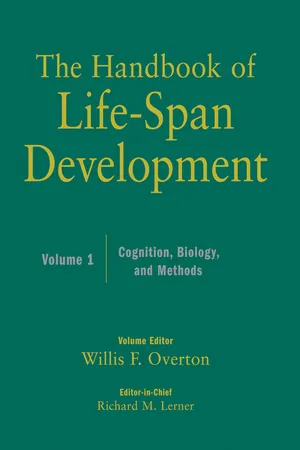Psychology
Biological Bases of Behavior
The biological bases of behavior refer to the influence of physiological processes on an individual's actions, thoughts, and emotions. This includes the study of the brain, nervous system, genetics, and hormones, and how they impact behavior. Understanding these biological underpinnings is crucial for comprehending various psychological phenomena and developing effective interventions for mental health issues.
Written by Perlego with AI-assistance
Related key terms
1 of 5
6 Key excerpts on "Biological Bases of Behavior"
- eBook - ePub
- Nancy Fenton, Jessica Flitter, Jessica Flitter(Authors)
- 2015(Publication Date)
- Research & Education Association(Publisher)
Chapter 5 Biological Bases of BehaviorBiological psychology can be traced to the beginnings of psychology because it has its roots in physiology. The field of biological psychology , also called neuroscience , focuses on how genes, the nervous system, and the endocrine system influence behaviors and mental processes. Technological advances have allowed biological psychologists to provide a more complete understanding of what occurs on a physiological level during a psychological experience such as thinking or memory.Heredity, Environment, and EvolutionAn important aspect of the study of psychology is the interplay among genetic, environmental, and evolutionary influences. Complex human traits, such as intelligence, aggression, altruism, and personality, are influenced by all of these factors. For instance, psychologists attempt to determine how an individual’s level of aggression is impacted by inheritance and exposure to violence, as well as why aggressive tendencies were naturally selected.Biologists and psychologists are both interested in the various influences of nature and nurture on human traits. Biologists study physical traits, such as height and eye color, or susceptibility to diseases, such as cancer. In contrast, psychologists are interested in behavioral traits and psychological illnesses. Behavioral traits include aggression, intelligence, personality, etc.; psychological illnesses include anxiety, schizophrenia, depression, etc. The scientific discipline of behavioral genetics attempts to integrate the influences of heredity, environment, and evolution in terms of their effect on human behavior.HeredityBiological psychologists are interested in the study of heredity, or how the traits of parents are transmitted biologically to offspring. The nucleus of each human cell contains forty-six chromosomes , twenty-three donated by each parent. Chromosomes that determine gender are known as the X and Y chromosomes . One X chromosome is donated by the mother, and either an X or Y chromosome is donated by the father. An XX individual is female; an XY person is male. Each chromosome contains genes , which are made up of a chainlike molecule called deoxyribonucleic acid (DNA) . Each individual gene can be either dominant or recessive. A dominant gene takes precedence over a recessive gene for that particular trait. For the gene that determines eye color in humans, brown is the dominant gene and blue is the recessive gene. If either parent donates a dominant gene for eye color, the child will have brown eyes. If both parents donate recessive genes for eye color, the child will have blue eyes. A Punnett square can be used to predict the outcome of various traits. The genotype is the genetic makeup for a trait in an individual, which may or may not be expressed, while the observable characteristics of genes are referred to as the phenotype - eBook - ePub
- B.D. Hames(Author)
- 2020(Publication Date)
- Taylor & Francis(Publisher)
- Biological Bases of BehaviorPassage contains an image
A1 EVOLUTION AND BIOLOGICAL PSYCHOLOGYKey NotesThe biological context of psychologyPsychology is a biological science: we are products of evolution, and our mental processes and behavior depend on physiological processes. Some approaches to psychology emphasize this biological basis, examining human behavior in an evolutionary context, comparing human behavior with that of other species, or examining its physiological bases.
Modern species, including humans, have evolved by processes of natural selection. The relationships amongst species are described by a phylogenetic tree.EvolutionGenetics and the ‘nature-nurture’ issueWe inherit genes that code for particular molecules, and these form our genetic makeup (genotype). Our genotype influences our structural and psychological phenotype (final individual characteristics). Extreme positions on the ‘nature-nurture’ issue have been largely replaced by a recognition of the importance of both genetic and environmental influences on psychological characteristics.Related topics
- The nature of development (H1 )
- Heredity, the environment and intelligence (K8 )
The biological context of psychology
Whatever else it may be, psychology is a biological science. This is, first, because we are the products of evolution. Second, mental processes and behavior are dependent on the nervous system and the endocrine system. Biological psychology (or psychobiology) includes any approach to psychology that places it in its biological context; that is, examining the Biological Bases of Behavior. In its broadest sense, this can be the examination of the evolution of human behavior, in a field known as evolutionary psychology. Principles from studies of the adaptive functions of structures and behaviors in other species are extended to try to explain human behavior. The approach to social behavior that this leads to is known as sociobiology. This applies Darwinian principles of evolution to the study of social, and particularly reproductive, behavior. A key concept is the selfish gene. In this view, all animal behavior is interpreted as having the goal of increasing the proportion of the individual’s genes in the next generation. The direct comparison of human behavior with that of other species is known as comparative psychology. Usually, it is assumed that the underlying processes examined in other species are the same as, or similar to, those in humans, and this itself implies evolutionary continuity. Physiological psychology is the study of the physiological mechanisms, especially those of the nervous and endocrine systems, underlying behavior and mental processes. Since much of our information about physiological mechanisms comes from studies of laboratory animals, physiological psychology assumes similarity of mechanisms, and evolutionary continuity. Neuropsychology is the study of the neural mechanisms, especially in the cerebral cortex, that underlie psychological, particularly cognitive, processes (see Topic A4 - eBook - ePub
The Handbook of Life-Span Development, Volume 1
Cognition, Biology, and Methods
- Richard M. Lerner, Willis F. Overton, Richard M. Lerner, Willis F. Overton(Authors)
- 2010(Publication Date)
- Wiley(Publisher)
CHAPTER 5Biology, Evolution, and Psychological DevelopmentGARY GREENBERG and TY PARTRIDGEWHAT IS PSYCHOLOGY?
Taking a cue from Alice in Wonderland, we always believe it is best to start at the beginning. Thus, we start this discussion of the relation of biology to psychology with an understanding of the nature of the science of psychology. Succinctly, Psychology is the biopsychosocial science of animal behavior. Animal behavior is included to avoid references to other uses of the term, such as the physicist’s description of the behavior of particles. Furthermore, the implication here is that only animals behave in the psychological sense; in addition, we believe that behavior requires a nervous system, again restricting psychological behavior to animals. The idea that plants can behave in the psychological sense rears its head every so often and is quickly dismissed: “The past three years have witnessed the birth and propagation of a provocative idea in the plant sciences. Its proponents have suggested that higher plants have nerves, synapses, the equivalent of a brain localized somewhere in the roots, and an intelligence” (Alpi et al., 2007, p. 135; see also Dudley & File, 2007). This same sentiment can be extended to recent developments in the realm of artificial intelligence and naturalistic theologies such as the Gaia hypothesis (Lovelock, 1979). The adaptive behavior of complex systems and neural network computing systems are qualitatively different than psychology.Implied by the perspective that psychology is the biopsychosocial science of behavior is the assumption that behavior is influenced by biological, psychological, and social factors, among others. In this context, it is critical to understand the significance of the important organizing principle of integrative levels: “a view of the universe as a family of hierarchies in which natural phenomena exist in levels of increasing organization and complexity” (Aronson, 1984, p. 66). This is a refutation of atomistic/ reductionistic principles and an affirmation of holism—that wholes cannot be reduced to their parts; that “more is different” (Anderson, 1972; Kauffman, 2007; Overton, 2006). Indeed, “hierarchy is a central phenomenon of life. Yet it does not feature as such in traditional biological theory” (Vrba & Eldredge, 1984, p. 146). Psychology is one of a growing number of areas of study falling under the metasciences of holism and complexity. - eBook - ePub
Adult Psychopathology, Second Edition
A Social Work Perspective
- Francis J. Turner(Author)
- 1999(Publication Date)
- Free Press(Publisher)
THE BIOLOGICAL BASES OF PSYCHOPATHOLOGY Harriette C. JohnsonIn social science, the nature/nurture controversy has shaped causal models of behavior…. Now, [we] will need to be trained in the new person-environment paradigm, which includes the integration of nature and nurture…. [We] need to be open to new concepts. Do not fear integration of social and physical science, but welcome it This is the future [emphasis added].—A. M. Johnson and S. Taylor-Brown (1997) Genetics research and social work educationSocial Work Education Reporter, 45 (2): 10S ince the first edition of this book 15 years ago, knowledge about the neurobiological bases of psychopathology has advanced at a phenomenal rate. Research unequivocally supports a biopsychosocial model of psychological function, putting to rest the dichotomies of nature versus nurture and biology versus environment that have influenced our thinking for so many decades. The avalanche of new information in the past decade about the relationship of neurobiology to psychological functioning has been activated by major technological advances in brain imaging, biochemical analysis, electrophysiological measurement, and other procedures. The new discipline of neuroscience now provides a scientific foundation for understanding the psychological events of emotion, behavior, thinking, and addiction that was missing from all theoretical models until recently. It has generated new knowledge about child development. As we approach the twenty-first century, no theory of human behavior or human development that runs counter to this knowledge base merits serious consideration, beyond historical interest.In this second edition, central concepts of today’s knowledge will be emphasized. The first edition of Adult Psychopathology - eBook - PDF
- Jair C. Soares, Samuel Gershon, Jair C. Soares, Samuel Gershon(Authors)
- 2003(Publication Date)
- CRC Press(Publisher)
43 Biological Basis of Personality Disorders CUNEYT ISCAN University of Massachusetts Medical School, Worcester, Massachusetts, U.S.A. CHARLOTTE L. ALLPORT and KENNETH R. SILK University of Michigan Health System, Ann Arbor, Michigan, U.S.A. I. OVERVIEW As we move beyond the 1990s, past the decade of the brain and into a new millennium, there has been an exponential increase in knowledge into understanding the biological basis of human psychology and beha-vior. Freud’s original concept of the biological basis of behavior, expressed in the ‘‘Project’’ [1] at the close of the 19th century, may become reality in the early parts of the 21st century. Yet to achieve complete understanding the task before us remains enormous. As we continue research into understanding the etiol-ogy of psychiatric disorders, the complexity of the human brain and behavior demands integrating differ-ent theoretical approaches and applying reductionism whenever necessary without losing perspective. Our cur-rent level of knowledge in the area of behavioral sciences compels us to bring together data at many levels of analysis. Those data include molecular genetics, neuro-chemistry, neurophysiology, cognitive science, and developmental psychology/psychopathology [2]. We now appear to possess the technology and the means to improve upon the technology to provide ever more sophisticated data from these fields that will facilitate our understanding of behavior at the molecular level. Prior to the 1980s, most explorations into the cause of personality disorders were relegated to the area of psychological theories [3]. These theoretical proposi-tions were based on appreciating fully the developing individual in his/her environment and the reaction of that individual to interpersonal experiences [4,5]. - eBook - PDF
Personality
Theory and Research
- Daniel Cervone, Lawrence A. Pervin(Authors)
- 2018(Publication Date)
- Wiley(Publisher)
241 9 Biological Foundations of Personality Questions to be Addressed in this Chapter Temperament Evolution, Evolutionary Psychology, and Personality Genes and Personality Mood, Emotion, and the Brain Plasticity: Biology as Both Cause and Effect Neuroscientific Investigations of “Higher-Level” Psychological Functions Summary Major Concepts Review Chapter Focus Why are some people generally happy and others sad, some energetic and others lethargic, some impulsive and others cautious? Why do men’s and women’s behaviors differ; for example, why are women more likely to wear makeup and men more likely to pay for dinner on a first date? Why does everyone recognize that some acts (e.g., incest) are immoral or “taboo,” even if they do not directly harm anyone? Do we learn these feelings and behaviors, or might they be part of our biological makeup? Scholars have contemplated such questions for ages. In the 1880s, the British sci- entist Sir Francis Galton contrasted “nature” (heredity) with “nurture” (environment), setting the stage for decades of theory, research, and debate about their relative importance. In the recent era, scientific advances have brought many of the issues into sharper focus. This chapter presents some of those advances. We explore six topics: biologically based individual differences evident early in life, or temperament; the shaping of personality by processes from our ancestral past, or evolution; how person- ality is influenced by genes; the neuroscience of mood and emotion; environmental influences on biological structures, or plasticity; and the neural bases of cognitively “higher-level” functions, including those involving self. BIOLOGICAL FOUNDATIONS OF PERSONALITY 242 Questions to be Addressed in this chapter 1. How, and why, do infants differ in temperament? 2. How can the study of human evolution inform our understanding of the personalities of contemporary humans? 3.
Index pages curate the most relevant extracts from our library of academic textbooks. They’ve been created using an in-house natural language model (NLM), each adding context and meaning to key research topics.





